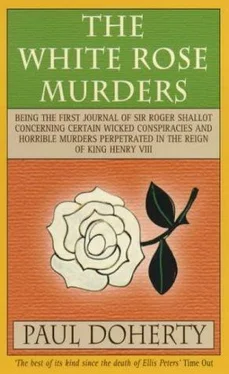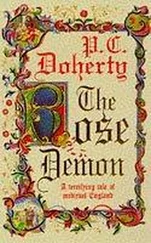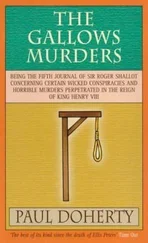Paul Doherty - The White Rose murders
Здесь есть возможность читать онлайн «Paul Doherty - The White Rose murders» весь текст электронной книги совершенно бесплатно (целиком полную версию без сокращений). В некоторых случаях можно слушать аудио, скачать через торрент в формате fb2 и присутствует краткое содержание. Жанр: Исторический детектив, на английском языке. Описание произведения, (предисловие) а так же отзывы посетителей доступны на портале библиотеки ЛибКат.
- Название:The White Rose murders
- Автор:
- Жанр:
- Год:неизвестен
- ISBN:нет данных
- Рейтинг книги:4 / 5. Голосов: 1
-
Избранное:Добавить в избранное
- Отзывы:
-
Ваша оценка:
- 80
- 1
- 2
- 3
- 4
- 5
The White Rose murders: краткое содержание, описание и аннотация
Предлагаем к чтению аннотацию, описание, краткое содержание или предисловие (зависит от того, что написал сам автор книги «The White Rose murders»). Если вы не нашли необходимую информацию о книге — напишите в комментариях, мы постараемся отыскать её.
The White Rose murders — читать онлайн бесплатно полную книгу (весь текст) целиком
Ниже представлен текст книги, разбитый по страницам. Система сохранения места последней прочитанной страницы, позволяет с удобством читать онлайн бесплатно книгу «The White Rose murders», без необходимости каждый раз заново искать на чём Вы остановились. Поставьте закладку, и сможете в любой момент перейти на страницу, на которой закончили чтение.
Интервал:
Закладка:
My master, pale-faced, his forehead covered with a sheen of sweat, groaned and turned away. Agrippa beckoned me to follow. A cook, sitting in the shade of a market stall, cackled with laughter and performed his own minor execution of a hapless chicken, slicing the neck and allowing the headless corpse to totter for a while before it collapsed in a heap of bloody feathers. My master hurried away to vomit in a corner. Agrippa waited for him to regain his composure.
'I told you,' he murmured, 'the blood letting by our King is just beginning. The Kingdom will be covered by dark pools of blood.'
Agrippa urged us on and we climbed the hill towards the main gates of the castle where the Red Lion Rampant banner of Scotland fluttered in the wind. A wild thought occurred to me and, for the first time, one of the threads in the mystery of Selkirk's poem began to unravel.
We crossed the lowered drawbridge and went under an arched entrance depicting the wonderfully carved scene of the Annunciation. A burly captain of the guard arranged for our horses to be stabled and immediately took us upstairs into what Agrippa called the Lion Chamber, a long, wooden-panelled room with black and white floor tiles which shimmered in the torch light. These were lozenge-shaped and I remembered them particularly because they were decorated with golden love knots. At the south end of the hall was a huge canopied fireplace and, above it, a blue and gold tapestry bearing the royal arms of Scotland. Beneath this was a large, oaken table and two high-backed chairs, also of oak, cushioned with cloth of gold and fringed with silver silk.
'The Scottish lords have made themselves at home,' Agrippa muttered.
The captain invited us brusquely to sit on a bench before the table and hurried out of a side door. We must have waited half an hour. A serving wench brought us flagons of watered beer. Both my master and myself took in our surroundings, whilst Agrippa, perched on the edge of the bench, hummed softly to himself, rocking to and fro like some cheerful sparrow.
At last the captain re-entered, accompanied by three soldiers. Behind them were two men. One was dressed in a dark blue jerkin and hose. He was an elegant fellow with steel-grey hair and bronzed face, his sensuous mouth fringed by a neatly trimmed beard and moustache. His companion, swathed in a dark tawny robe as if he felt the cold, was a different kettle of fish: jet black hair framed a white face. He would have been handsome had it not been for the close-set eyes and the petulant cast to his mouth.
'My Lord d'Aubigny and Gavin Douglas, Earl of Angus!' Agrippa hissed as we rose to greet them.
I must say this openly: d'Aubigny I liked immediately, a gentleman born and bred, a true courtier like myself. All Angus did was pull his robe tighter around him and slump in one of the high-backed chairs to glower at us. D'Aubigny, however, came down from the dais and shook Agrippa's hand vigorously before allowing the doctor to introduce both my master and myself. He talked to us kindly, his grey eyes dancing with amusement as he questioned us about our journey. Had it been safe? What troubles had we encountered? His English was very good, though tinged with a pronounced French accent. I looked at him curiously for Master Benjamin and Doctor Agrippa had told me about him on our journey to the castle. He was a distant cousin to James IV but his father had been exiled to France so he had been reared and educated in the French fashion. D'Aubigny waved aside our letter of introduction and called for more refreshments before joining Angus on the other side of the table.
'Well, Master Daunbey,' d'Aubigny began, 'a representative of the English King is always welcome but doubly so when he is the nephew of the great Lord Cardinal.' He leaned forward with his hands clasped together on the table. 'So, Master Envoy, what messages do you bring?'
My master looked nervously at the Earl of Angus who had hardly moved except to gulp noisily from a goblet of wine. D'Aubigny himself acted as if Angus was scarcely there.
'Queen Margaret,' my master began bluntly, 'wishes to return to Scotland.'
D'Aubigny spread his hands. 'There is no obstacle,' he replied. 'The Queen is always welcome back. I have said this many times, Doctor Agrippa, have I not?'
The good doctor nodded his head vigorously. When I glanced sideways I noticed how his face had changed; the air of bonhomie and lazy good humour had disappeared. His eyes were hard now, glaring at d'Aubigny with the occasional sideways knowing glance at the sulky Angus.
'I repeat,' d'Aubigny continued, 'the Queen is welcome back. I will take an oath over a casket of the most sacred relics on this. I have explained to King Henry many times that his worthy sister left Scotland of her own accord -or, should I say, fled? We did not separate her from her children, but the Council cannot allow our infant King to wander where he will.'
D'Aubigny shifted in his seat. Perhaps he was disturbed by Agrippa's hard glance. He began to emphasise his points with one hand.
'The Lady Margaret was appointed Regent by no less a person than her late husband in his will. However, she infringed that mandate by marrying My Lord of Angus within a year of her husband's death!' D'Aubigny turned to his companion. 'My Lord, you would corroborate that?'
Angus slouched like a spoiled brat, nodded and began to tap noisily on the table top with his fingers. Again d'Aubigny repeated the question, this time a little more harshly.
'My Lord Douglas, you will corroborate that?'
This time d'Aubigny waited and would have done till the Second Coming. Angus stirred.
'Och, aye!' the fellow replied sourly. 'I will confirm that. Perhaps we were too hasty. The marriage brought neither of us happiness, especially when my lady wife insisted on hiding in one castle or the other so I could not follow her.' He smiled sardonically at Agrippa. 'You know the Douglas motto – "Better to hear the lark sing in the woods and fields than the mouse squeak in the corridors and chambers of the castle." '
'What My Lord Douglas is saying,' d'Aubigny said meaningfully, 'is that the Queen hid herself away, first in Stirling, then in other castles. There was an attempt,' he added, 'aided and abetted by other nobles, to rescue the Queen's children from the rightful custody of the Council. But this came to naught and so Queen Margaret slipped over the border into England.'
'Your Grace,' Agrippa interrupted harshly, 'a mother's place is with her children. In your custody her second babe, Alexander, Duke of Ross, died!'
'A Queen's rightful place,' d'Aubigny tartly replied, 'is in her kingdom with her children, one of whom, although still a bairn, is the appointed King.' D'Aubigny's eyes softened. 'C'est vrai, Alexander did die, but he was a sickly boy, born two months early. Anyway, I do not think we should discuss the young Duke of Ross, should we?'
I looked sideways. Do you know, the little bugger Agrippa actually blushed whilst Douglas lost his solemn look. Indeed, the fellow became agitated. I saw my master stiffen, those mild, blinking blue eyes had caught something, though God knows what. D'Aubigny sensed he had triumphed in this repartee and stood up, smiling kindly at us.
'You see, your mission is ended. Master Benjamin, Her Grace is most welcome back. Indeed, I could invite the Archangel Gabriel from Heaven – but it would be up to him whether he came or not!'
My master rose and bowed.
'Your Grace, I thank you for your time.'
'Tush, man,' d'Aubigny replied, 'it was nothing. In the morning we will meet again.' He looked at Angus and his smile faded. 'This time alone.'
I tried to question my master on what he had learnt from d'Aubigny, once we were shown up to our chamber, but Master Benjamin was in one of his more withdrawn moods. He wandered off then came back to lie on his bed, staring up at the ceiling. Now and again he would glance at me.
Читать дальшеИнтервал:
Закладка:
Похожие книги на «The White Rose murders»
Представляем Вашему вниманию похожие книги на «The White Rose murders» списком для выбора. Мы отобрали схожую по названию и смыслу литературу в надежде предоставить читателям больше вариантов отыскать новые, интересные, ещё непрочитанные произведения.
Обсуждение, отзывы о книге «The White Rose murders» и просто собственные мнения читателей. Оставьте ваши комментарии, напишите, что Вы думаете о произведении, его смысле или главных героях. Укажите что конкретно понравилось, а что нет, и почему Вы так считаете.












